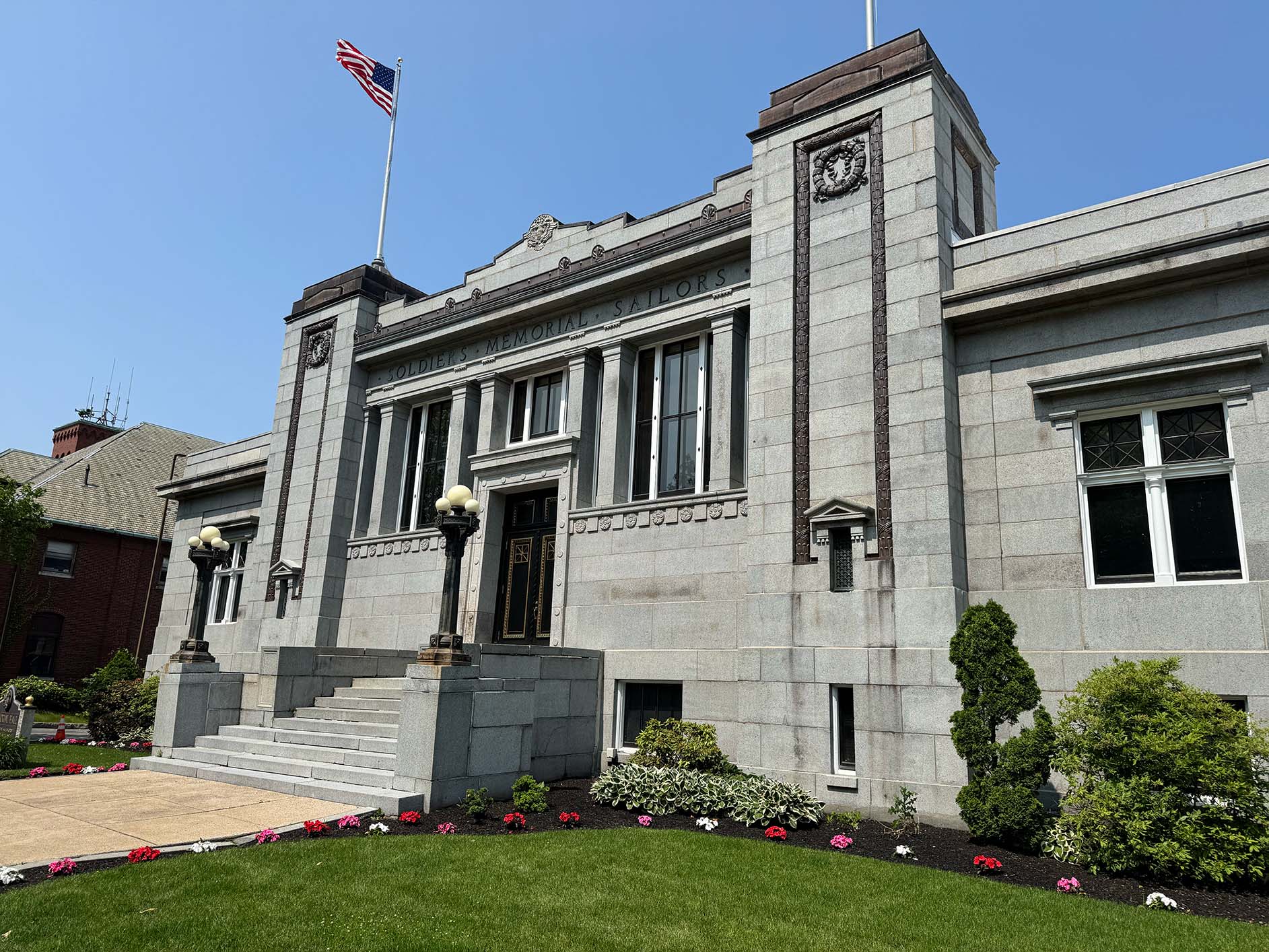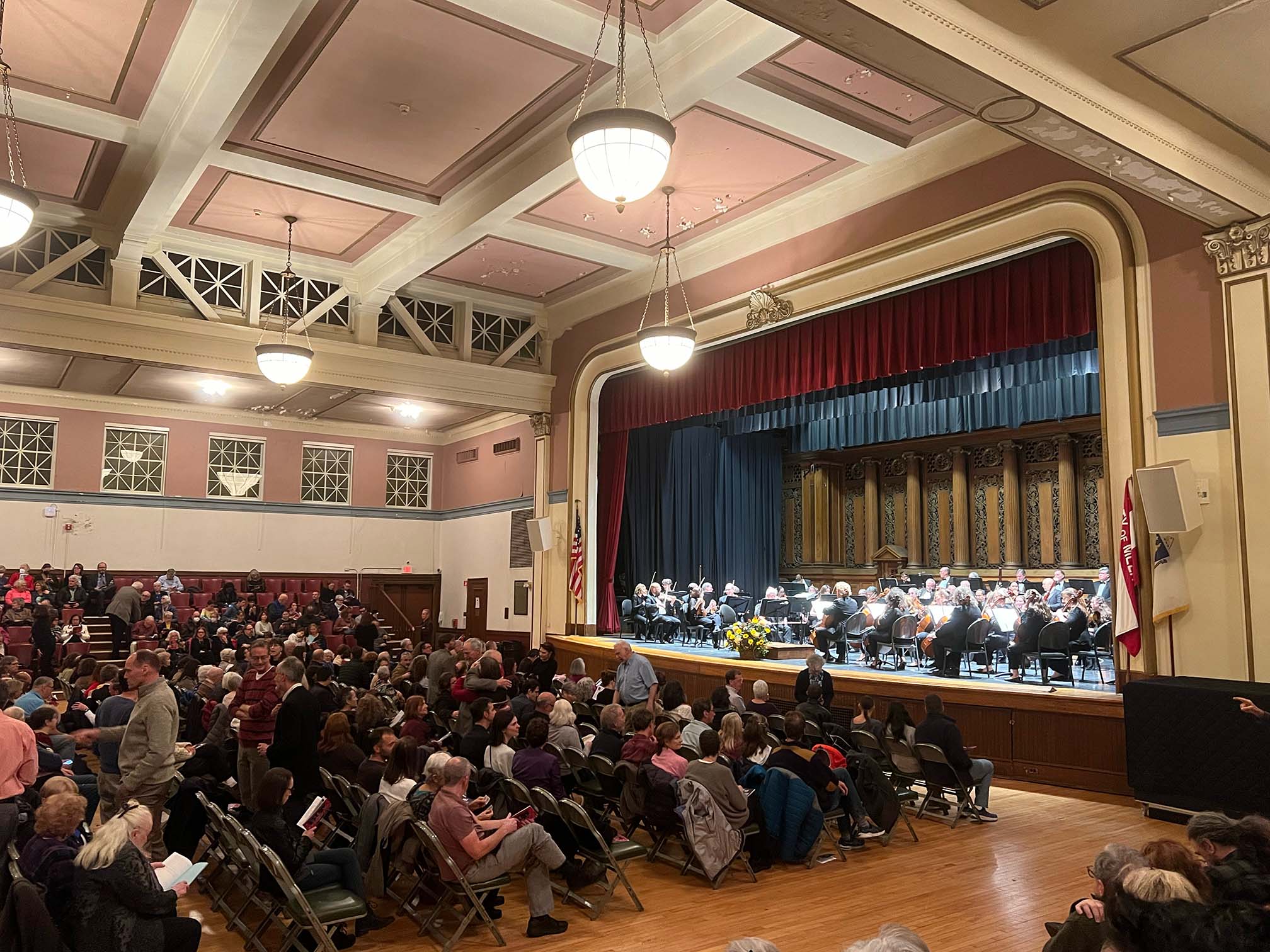Memorial Hall Sparks Budget Debate in City Council
By Ellen Putnam

As the City Council's Appropriations and Oversight Committee wrapped up their budget hearings on Monday, the budget for the Soldiers and Sailors Memorial Building, better known as Memorial Hall, sparked debate when two councilors proposed defunding the building entirely.
Memorial Hall has been a city asset since its construction in 1912, and hosts the Melrose Symphony Orchestra (the country’s oldest continuously performing volunteer orchestra), the Melrose Youth Ballet’s Nutcracker performances, the annual Melrose Arts Festival, the Melrose Rotary Club’s weekly meetings, and a variety of other events, from school concerts to fundraisers to boxing matches.
The building hosted 259 events this fiscal year, with approximately 48,000 guests in attendance, and brought in approximately $110,000 in revenue for the city. The city budgeted $228,197 to run the building this fiscal year, for a net loss of over $100,000.
The city pays for Memorial Hall’s staff and maintenance costs, such as utilities and basic upkeep, while the Friends of Melrose Memorial Hall raises funds for more extensive repairs and capital projects. Two years ago, the Friends hosted a fundraising gala, and they have launched a legacy donation program to fund restoration of the Grand Army of the Republic Room on the upper level of the building, where repairs are most urgently needed.

The 175th birthday celebration for Melrose was held at Memorial Hall last month
Photo Credit: Nancy Clover
Due to rising costs in a number of areas that are outpacing revenue growth, Mayor Jen Grigoraitis and her administration needed to make $2.6 million in budget cuts to city services for Fiscal Year 2026 (FY26), which begins in July, on top of $4 million in cuts to the Melrose Public Schools, to fill the gap between revenue and required expenses. Last week, the City Council approved three override questions to go on November's municipal ballot which, if approved by Melrose voters, would partially fill this funding gap for the next few years.
Grigoraitis proposed to fund Memorial Hall at $215,937 for FY26, a 5.4% decrease from this year’s budget. Like many city departments, most of the hall’s budget goes to salaries for the executive director and four part-time operations assistants who keep the building operational for rentals. In order to reduce Memorial Hall’s budget, staff will see reduced and modified hours, which may limit the hall’s availability for rentals.
Grigoraitis told the City Council last month that Memorial Hall operates at a loss, but she noted that the cost to keep the building open for rentals is $933 per day, while the cost to hold onto the building without renting it (and earning revenue from those rentals) is $720 per day, “because we continue to need to pay the debt service on the work that was done to the envelope, and we would have to make sure that the pipes don’t freeze, and it needs to be insured if we’re not selling it,” she explained.
Melrose has been selected for a technical assistance grant from the Metropolitan Area Planning Council to “develop a strategic plan for Memorial Hall,” Grigoraitis said, “and determine how we can best maximize that building, which is a beloved community treasure, a key part of our city’s arts and culture activities, and a structure that needs significant financial investment to stay functioning and become budget neutral, and, ideally, a revenue generator.” This plan, which is expected to be developed in the next year, could indicate whether the city would be best served by maintaining control of Memorial Hall, handing it over to a management company, or selling it off entirely.

This year's Melrose Arts Festival at Memorial Hall
At-Large City Councilor Ward Hamilton opened the Council’s discussion of the Memorial Hall budget by proposing to eliminate the budget for Memorial Hall entirely. “How do we approve the department budget before us when we don’t have a city engineer or a facilities director?” he asked, “When we cannot fully fund our police or fire departments the way they deserve to be? When we are literally laying off dozens of teachers? What is the message we would be sending to the taxpayers? A municipality that operates a non-essential, ancillary resource at a loss during a time like this is literally telling the community we don’t really need an override, and that is the wrong message to be sending.”
Ward 6 Councilor Cal Finocchiaro, who supported the proposal, added, “It pains me to vote against this budget, and I do not take it lightly. But every time I think about this budget and how we’re spending money to keep the building open, I think of Mr Murphy, who just lost his job at the middle school, and we’re having Principal Merrill cover both buildings. I think about the teachers that we’ve laid off. We’re asking the community to vote on a very expensive override in the fall, and we’re giving up so much right now. I wish there was something else we could do.”
Memorial Hall Executive Director Kathy Pigott-Brodeur noted that the Board of Trustees for the hall had decided to raise their fees, which would bring in an additional $40,000 to $50,000 next year if the number of bookings in FY26 remained the same. This could mean the city’s net loss on Memorial Hall in FY26 might be closer to $50,000.
Ward 3 Councilor Robb Stewart called Memorial Hall a “loss leader,” which Ward 5 Councilor Kim Vandiver explained is “something you lose money on that brings people in the door so that they spend more money throughout your entire business. I believe the classic example of a loss leader is hot dogs at Costco,” she noted, “where the CEO has threatened everyone on the staff that you can never raise them above a dollar, because that’s what gets people in the door.”
Trustee Lou Izzi noted that people who attend events at Memorial Hall often spend money at local businesses, boosting the entire business community and providing economic value that isn’t captured in the revenue figures.
“I was thinking about the secondary and tertiary impacts of closing an institution like this,” reflected Ward 7 Councilor Devin Romanul, “that it’s difficult to make that kind of decision in a vacuum. I was at the grocery store today, and my 5 year old pulled out the bottom grapefruit. Unbeknownst to him, it was holding up the pyramid of the other grapefruits.”

The Melrose Rotary Club donated $20,000 to Memorial Hall restoration this spring
Photo From Melrose Rotary Club
“If we reduce this budget to zero,” Romanul went on, “things can break. I don’t know if anyone has not heated their house when they go away on vacation, but it really stinks when you come home to water in the basement.”
At-Large Councilor Ryan Williams added, “If you reduce the budget to zero, you’ve effectively cut $50,000 in budgeted expenses for utilities and heat and ongoing maintenance, things that might come back to bite us. Certainly we would need the building to be heated, we would need the electricity to be left on, and those costs would have to enter the budget at some other point. And we are in an unfortunate moment where our budget is extremely tight, and I don’t think that $50,000 lives anywhere else in the budget right now.”
While councilors entertained the idea of making cuts to the Memorial Hall budget without completely eliminating it, Vandiver noted, “There are eight lines in this budget and none of them seem particularly fluffy. I don’t know where you would even cut anything.”
“I respect the proposal in that I know our constituents are asking us to be fiscally responsible,” added Ward 1 Councilor Manjula Karamcheti. “But there’s a budget before us that already includes cuts in it.”
Due to how the budget approval process works, when the City Council votes to reduce a budget line, they cannot add it back into another area of the budget, but instead have to wait for it to (potentially) return at the end of fiscal year as free cash.
“If we cut this budget,” said City Council President Leila Migliorelli, “it’s not like we’re saving the schools with it. We can’t bring back teachers, we can’t bring back principals, so it gives me pause as to why we would be doing this. It’s a little performative to cut a budget with no plan.”
“We’ve gone through seven weeks of budget hearings and have cut nothing from any budget,” she went on. “We’ve left in our salaries, which total $55,000. It’s kind of questionable whether we need that.”
(When other councilors offered to cut their salaries, Committee Chair Mark Garipay noted, “We’ve already voted on that. We can’t go back and change that at this point.”)
“The other piece of this is lack of public conversation and input,” Migliorelli added. “I would not be comfortable, and I’m fairly shocked that we would go and try to cut a building without any public input. Especially when there are over 200 events already planned there for next year. There are camps there this summer. So I don’t really see how this is helping the community at all, particularly since we have a plan as to how to deal with it. If we close the building, we would have to cancel all of those contracts and those events with zero plans.”

At a Melrose Symphony Orchestra concert last fall
“The mayor passes a budget down to us, and we are elected to look at it and make decisions on it,” reflected Finocchiaro. “And we are limited with what we can do. And the zeroing of this budget is not a perfect situation, but we are talking about a dire budget. I love Memorial Hall and it is an essential part of our community, but it’s not essential when we’re talking about a very dire budget.”
“I believe very strongly that doing this right now is actually the worst thing we could do,” replied Karamcheti. “I have been someone who has championed looking at Memorial Hall and trying to figure out how it could become something closer to Chevalier Theater in Medford, and now we actually have a $95,000 grant to do that. So it seems very shortsighted to me to cut it now as opposed to keeping it going until we can make a decision next year.”
“I do have concerns about the gap” between revenue and expenses, said Stewart. “I would support this budget but with the expectation that the administration will solve this problem going forward. And I know they have the grant to help them do that, so I would expect that this problem is going to be solved by next year, and they will figure out how Memorial Hall can be used, and be financially beneficial as well as a benefit to the community.”
Izzi noted that the building’s value is not just in its worth as a venue, but in its history and symbolic meaning. “The Soldiers and Sailors Memorial Building is a living memorial dedicated to the men and women that have fought for our freedom,” he said. “It’s not just a revenue stream or a revenue source, it’s a civic center. It’s part of the fabric of our community. And so I understand that it might operate at a loss, but the reality of the matter is that it symbolizes a lot more than just dollars and cents coming into this community.”
“The fiscal pinch is hitting everywhere,” reflected Romanul, “and it’s making us pit teacher salaries against events. It’s making us pit paving roads against a DPW director against a firefighter, and those are very difficult conversations to have, to figure out what is the public utility, and that’s not just in dollars and cents. And I think that we have to feed the soul, too. I think that is a part of the character of our community.”

Follow Us: